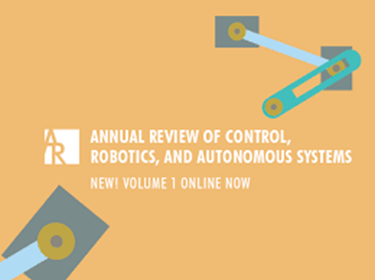A Control Framework for Ocean Wave Energy Conversion Systems: The Potential of Moments
IF 14
1区 计算机科学
Q1 AUTOMATION & CONTROL SYSTEMS
Annual Review of Control Robotics and Autonomous Systems
Pub Date : 2023-11-14
DOI:10.1146/annurev-control-070523-115155
引用次数: 0
Abstract
The control of wave energy converters (WECs) to maximize power capture is a challenging problem. In particular, the nature of the wave excitation, which is in general panchromatic (or multi-sinusoidal), presents a reciprocating energy source that needs to be rectified through some means. In addition, the development of suitable control-oriented models is also challenging, requiring correct representation of system hydrodynamics and power take-off (PTO) components, while also lending themselves to control synthesis and real-time computational performance, along with a challenging optimal control problem. This article presents a moment-based mathematical framework for the formulation and solution of WEC control. It shows that moments are ideally suited to WEC control in terms of their ability to accurately characterize the nature of the wave excitation force (and the consequent evolutions in the system variables) while also gracefully including hydrodynamic and PTO nonlinearities as well as a natural extension to WEC arrays. Model reduction, to mold the system model into a control-friendly form, is also a feature of this framework. Expected final online publication date for the Annual Review of Control, Robotics, and Autonomous Systems, Volume 7 is May 2024. Please see http://www.annualreviews.org/page/journal/pubdates for revised estimates.海浪能量转换系统的控制框架:矩势
如何控制波能转换器(WECs)以最大限度地捕获能量是一个具有挑战性的问题。特别是,波激发的性质通常是全色的(或多正弦的),呈现出一种往复的能量源,需要通过某种方式进行整流。此外,开发合适的面向控制的模型也具有挑战性,需要正确表示系统流体动力学和动力输出(PTO)组件,同时还需要考虑控制综合和实时计算性能,以及具有挑战性的最优控制问题。本文提出了一种基于矩量的WEC控制数学框架。它表明,力矩非常适合WEC控制,因为它们能够准确地表征波浪激励力的性质(以及系统变量的后续演变),同时还优雅地包括流体动力和PTO非线性以及对WEC阵列的自然扩展。模型简化,将系统模型塑造成一种易于控制的形式,也是这个框架的一个特点。预计《控制、机器人和自主系统年度评论》第七卷的最终在线出版日期是2024年5月。修订后的估计数请参阅http://www.annualreviews.org/page/journal/pubdates。
本文章由计算机程序翻译,如有差异,请以英文原文为准。
求助全文
约1分钟内获得全文
求助全文
来源期刊
CiteScore
28.30
自引率
2.20%
发文量
25
期刊介绍:
The Annual Review of Control, Robotics, and Autonomous Systems offers comprehensive reviews on theoretical and applied developments influencing autonomous and semiautonomous systems engineering. Major areas covered include control, robotics, mechanics, optimization, communication, information theory, machine learning, computing, and signal processing. The journal extends its reach beyond engineering to intersect with fields like biology, neuroscience, and human behavioral sciences. The current volume has transitioned to open access through the Subscribe to Open program, with all articles published under a CC BY license.

 求助内容:
求助内容: 应助结果提醒方式:
应助结果提醒方式:


